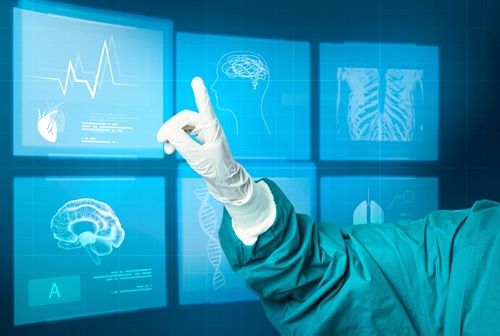Artificial Intelligence in Healthcare:
Have you ever heard the term Artificial Intelligence (AI) and wondered what it means? Well, it’s not as complicated as it sounds! AI is like a super-smart computer that can think and learn. It helps doctors and nurses in hospitals take care of people when they are sick. AI can find out what’s wrong, help doctors make decisions, and even assist during surgeries! Let’s dive into how artificial intelligence in healthcare is changing the way we stay healthy and feel better.
1 - What is Artificial Intelligence in Healthcare?
Imagine you’re building something with LEGO blocks, and you have instructions that help you build it step by step. Now imagine that the instructions can actually think and help you decide the best way to build faster and better. That’s kind of what AI does for doctors. AI looks at pictures, like X-rays, or tests, like blood tests, and helps doctors figure out what is wrong with a person.
For example, if you hurt your leg and a doctor takes an X-ray, AI can look at the picture and help the doctor see if your leg is broken. It does this quickly and without getting tired. This means doctors can help people faster and make sure they don’t miss anything important. That’s the beauty of Artificial Intelligence in Healthcare.
2 - How AI Helps in Healthcare
Artificial Intelligence in Healthcare can help in many ways. Here are some of the coolest ones:
1- Spotting Diseases Early:
AI can look at things like X-rays or blood tests to find out if someone is sick. It’s very fast and can spot problems even before they get worse. This is great because finding problems early means doctors can help people get better faster.
2- Personalized Medicine:
Everyone’s body is different. AI helps doctors figure out the best medicine or treatment for each person. It looks at all the information about a person, like their health history and lifestyle, and suggests the perfect treatment. This makes sure that the person gets the right help.
3- Helping with Surgeries:
AI can also help during surgeries. Sometimes, doctors use robots that are controlled by AI to help them make very small movements during an operation. These AI-powered robots help doctors perform delicate surgeries, and it means patients can heal faster.
4- Virtual Nurses:
Imagine having a virtual nurse who can remind you to take your medicine or help answer your health questions. AI assistants are becoming more common and can help people track their symptoms or even schedule appointments. They are super helpful, especially for people who need regular care.
5- Fighting Diseases Like Cancer:
AI is helping doctors understand and treat serious diseases like cancer. It looks at data from lots of patients and helps doctors find patterns. This helps doctors figure out the best way to treat these diseases and maybe even cure them one day.
6- Managing Hospitals:
Hospitals can be very busy places with lots of people needing help. AI helps keep things organized by managing patient records, scheduling appointments, and keeping track of who needs what. This means doctors and nurses can focus more on taking care of patients
3 - Why Is AI Important in Healthcare?
AI is really important because it makes healthcare faster, smarter, and more accurate. Here’s why Artificial Intelligence in Healthcare can play a key role:
- Speed: AI can look at medical tests really fast. This means doctors can find out what’s wrong quicker and start helping the patient sooner.
- Smart Choices: AI can help doctors make better choices by giving them all the information they need to pick the best treatment for a patient.
- Fewer Mistakes: Sometimes, doctors can make mistakes because they’re human. AI doesn’t get tired, so it can help doctors double-check everything and avoid mistakes.
- Saves Time: With AI helping, doctors and nurses have more time to spend caring for patients instead of doing paperwork or looking through test results.
- Cheaper Healthcare: When things run faster and smoother, it costs less money. This means healthcare can be more affordable for everyone.

4 - The Future of AI in Healthcare
AI is already making healthcare better, but there’s still more to come! In the future, AI will get even smarter. Here’s what we might see:
- More Helpful Robots: Robots will help doctors even more in surgeries. They will be able to do super-precise tasks, making surgeries safer and easier for doctors.
- Better Disease Fighters: AI will help doctors find cures for diseases like cancer and Alzheimer’s. By looking at data from lots of patients, AI can help figure out what works best.
- Helping People Everywhere: AI could help people in places where there aren’t many doctors. It can provide information and help doctors give advice from far away.
5 - Challenges of AI in Healthcare
Even though it’s great tool but there are still some challenges in Artificial Intelligence in Healthcare:
- Privacy: AI needs a lot of data to work well. It’s important that hospitals keep patient information safe and private.
- Trust: Some people worry about trusting a machine with their health. But it’s important to know that AI helps doctors, it doesn’t replace them.
- Cost: Getting AI systems in hospitals can be expensive at first, but in the long run, it can help save money.
FAQs About Artificial Intelligence in Healthcare
Artificial Intelligence in healthcare means using smart computers to help doctors diagnose, treat, and care for patients.
No, AI helps doctors do their jobs better, but doctors are still needed to make important decisions and care for patients.
AI-powered robots help doctors during surgeries by making very small and careful movements. This makes surgeries safer.
Yes, AI is safe. Hospitals just need to make sure they protect patient data and use AI responsibly.
AI helps doctors diagnose faster, provide personalized treatments, reduce mistakes, and save time and money.


